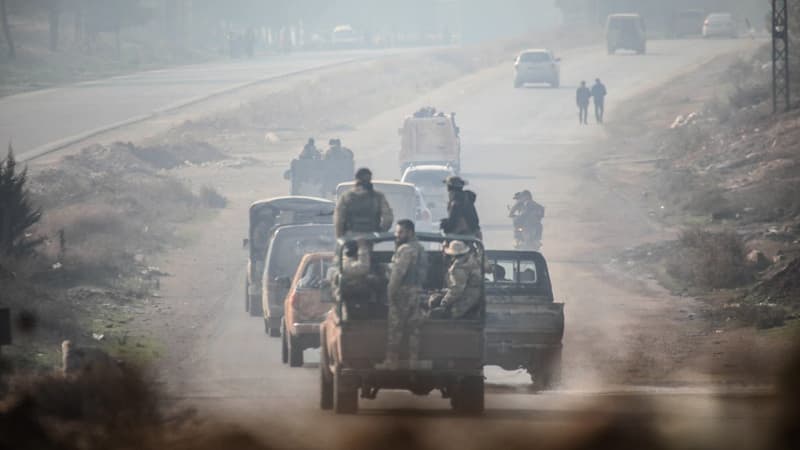Rebel factions announced they had “begun to encircle” the Syrian capital, Damascus, following a dazzling offensive that forced government forces to abandon several strategic positions.
They withdrew from towns located about ten kilometers from Damascus, indicated the Syrian Observatory for Human Rights (OSDH), which added that they had also abandoned their positions in the province of Qouneitra, bordering the Golan Heights annexed by Israel.
“Our forces have begun the final phase of the siege of the capital Damascus,” said a senior rebel coalition commander, Hassan Abdel Ghani. The Ministry of Defense, for its part, stated that “reports that our armed forces, present in all areas of the Damascus countryside, have withdrawn, are unfounded.”
On November 27, a coalition of rebels, led by the radical Islamist group Hayat Tahrir al-Sham (HTS) – considered terrorist by the UN, the United States and some European countries – launched an offensive from its stronghold in Idlib.
He captured dozens of towns and the strategic cities of Aleppo and Hama. This is the most spectacular advance in 13 years of war in Syria.
Bashar al-Assad did not appear publicly this week
Rami Abdel Rahmane, director of the OSDH, told AFP that local rebel fighters now control the entire province of Deraa, the birthplace of the 2011 uprising against the Bashar al-Assad regime, which returned to government control in 2018.
More weakened than ever, the Syrian president, whom the insurgents say they want to overthrow, has not appeared in public since his meeting last Sunday in Damascus with the Iranian Foreign Minister, Abbas Araghchi, whose country is an ally of Syria. government.
In central Syria, rebels are also at the gates of Homs, the country’s third city. According to the OSDH, at least seven civilians were killed on Saturday in Russian and Syrian attacks near the city.
If they seize it, only Damascus and the Mediterranean coast will remain in the hands of the forces of Bashar al-Assad, whose family has been in power for more than five decades.
Faced with the rebel advance, Hassan Abdel Ghani invited “all religions to calm down, stating that “the era of sectarianism and tyranny” “has passed forever”, while civilian witnesses denounce rocket fire “24 hours a day” in Homs.
More than 800 dead and 370,000 displaced since November
The conflict in Syria was triggered after the repression of a popular uprising that degenerated into civil war in 2011. It left more than half a million dead and divided the country into zones of influence with belligerents supported by different foreign powers.
The main ally of the Syrian Government, Russia, immersed in its war against Ukraine and which has military bases in Syria, has asked its citizens to leave the country, as have the United States and Iran, the other key support of the regime. regime.
In this context, a meeting dedicated to Syria began in Doha between the heads of the Turkish, Russian and Iranian diplomacies, whose countries have been partners since 2017 in the Astana process initiated to silence the weapons.
According to Qatari Prime Minister Mohammed bin Abdelrahmane Al-Thani, Bashar al-Assad “did not take the opportunity to dialogue and restore trust with his people” during the years preceding the rebel offensive, launched to everyone’s surprise.
The violence has left at least 826 dead, including a hundred civilians, since November 27, according to the OSDH, and at least 370,000 people have been displaced according to the UN.
Source: BFM TV


